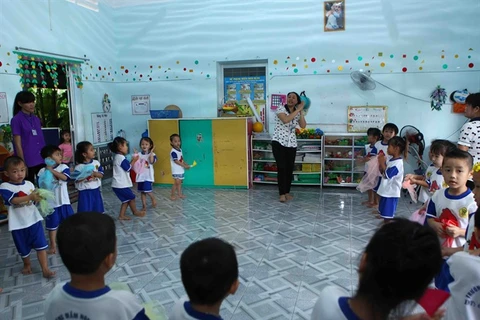Hanoi (VNS/VNA) - Whenever a new year approaches, low-income workers start to fret about finding schools, tuition fees, and arranging to drop off and collect their children at school.
Poor migrant workers, many without the all-important residential registration books, always face more difficulties in enrolling their children, reports the Lao Dong (Labour) newspaper.
The first child of Nguyen Van Khanh, a worker in Linh Trung Industrial Zone 2 in HCM City, had to miss education for a year because her father could not find a public school for her in the southern city.
Khanh and his wife moved from home in the southern province of Bac Lieu to HCM City 10 years ago and have two children aged 11 and 6.
Because of the lack of a class seat for his eldest daughter, she was sent back home to live with her grandparents and study at a local school.
Last year, she was reunited with her family in HCM City after completing the school transfer procedures.
“I thought it would be easy to apply for a public school near the industrial zone to continue her third grade, but I failed. So I was had no choice but to let her stay at home for one year,” the father told the newspaper.
“This year, I have tried for many months to enroll her in a public school, but now, as the new school year is approaching, no school has accepted her,” he said sadly.
The reason is that all primary schools near Linh Trung Industrial Zone (IZ) are overloaded, so priority is given to children who have HCM City residential books.
At their wits end, the couple eventually decided they would have to go back to Bac Lieu if they wanted to get an education for their daughter.
This sort of story is becoming more and more common among migrant workers in big cities.
Most migrant workers have to send their children back home to live with grandparents or relatives because they can’t find schools or even kindergartens for their children.
If parents are lucky enough to find a place for their children in public schools, they face other headaches, such as high tuition fees and making financial contributions to schools.
A female worker in Dong Van IZ in Ha Nam province in the north feels deep concern as the new school year arrives.
Her husband is unemployed. So her four-member family live on her monthly income of 5.2 million VND (240 USD).
Her modest income is hit hard when she pays tuition fees for two children at kindergarten.
Every month, she spends about 3 million VND (140 USD) for the daughters’ tuition fees, excluding insurance fees and meals.
She is frightened that this year tuition fees and other financial contributions might increase.
“I always have to borrow money from parents or relatives and pay them back when I receive my salary,” she said.
“We are luckier than many couples because we have a house and every month we have additional income from growing vegetables and poultry. Many couples who have to pay rent face more difficulties,” she told the paper.
Taking children to and from school and taking care of children after school is also a big problem for migrant workers because most work overtime.
Like many other fellow-workers in Bac Thang Long IZ in Hanoi, Mai and her husband had to arrange exact times.
“Many times we could not pick up the children on time and had to ask teachers to take care of them. It meant we had to pay more,” she said.
Sometimes, her husband did not come home on time and she had to go to work, so she had to ask her neighbours to watch her children.
The workers at IZs do not have enough time to drop off or collect their children, let alone helping them study and play.
Many workers have quit jobs or gone back to home provinces because they couldn’t manage their lives in the new environment.
“If each IZ had kindergartens and schools, lives of migrant workers like me would be easier,” said Cam Van Nhung, a worker in Hai Duong city.-VNA
Poor migrant workers, many without the all-important residential registration books, always face more difficulties in enrolling their children, reports the Lao Dong (Labour) newspaper.
The first child of Nguyen Van Khanh, a worker in Linh Trung Industrial Zone 2 in HCM City, had to miss education for a year because her father could not find a public school for her in the southern city.
Khanh and his wife moved from home in the southern province of Bac Lieu to HCM City 10 years ago and have two children aged 11 and 6.
Because of the lack of a class seat for his eldest daughter, she was sent back home to live with her grandparents and study at a local school.
Last year, she was reunited with her family in HCM City after completing the school transfer procedures.
“I thought it would be easy to apply for a public school near the industrial zone to continue her third grade, but I failed. So I was had no choice but to let her stay at home for one year,” the father told the newspaper.
“This year, I have tried for many months to enroll her in a public school, but now, as the new school year is approaching, no school has accepted her,” he said sadly.
The reason is that all primary schools near Linh Trung Industrial Zone (IZ) are overloaded, so priority is given to children who have HCM City residential books.
At their wits end, the couple eventually decided they would have to go back to Bac Lieu if they wanted to get an education for their daughter.
This sort of story is becoming more and more common among migrant workers in big cities.
Most migrant workers have to send their children back home to live with grandparents or relatives because they can’t find schools or even kindergartens for their children.
If parents are lucky enough to find a place for their children in public schools, they face other headaches, such as high tuition fees and making financial contributions to schools.
A female worker in Dong Van IZ in Ha Nam province in the north feels deep concern as the new school year arrives.
Her husband is unemployed. So her four-member family live on her monthly income of 5.2 million VND (240 USD).
Her modest income is hit hard when she pays tuition fees for two children at kindergarten.
Every month, she spends about 3 million VND (140 USD) for the daughters’ tuition fees, excluding insurance fees and meals.
She is frightened that this year tuition fees and other financial contributions might increase.
“I always have to borrow money from parents or relatives and pay them back when I receive my salary,” she said.
“We are luckier than many couples because we have a house and every month we have additional income from growing vegetables and poultry. Many couples who have to pay rent face more difficulties,” she told the paper.
Taking children to and from school and taking care of children after school is also a big problem for migrant workers because most work overtime.
Like many other fellow-workers in Bac Thang Long IZ in Hanoi, Mai and her husband had to arrange exact times.
“Many times we could not pick up the children on time and had to ask teachers to take care of them. It meant we had to pay more,” she said.
Sometimes, her husband did not come home on time and she had to go to work, so she had to ask her neighbours to watch her children.
The workers at IZs do not have enough time to drop off or collect their children, let alone helping them study and play.
Many workers have quit jobs or gone back to home provinces because they couldn’t manage their lives in the new environment.
“If each IZ had kindergartens and schools, lives of migrant workers like me would be easier,” said Cam Van Nhung, a worker in Hai Duong city.-VNA
VNA























